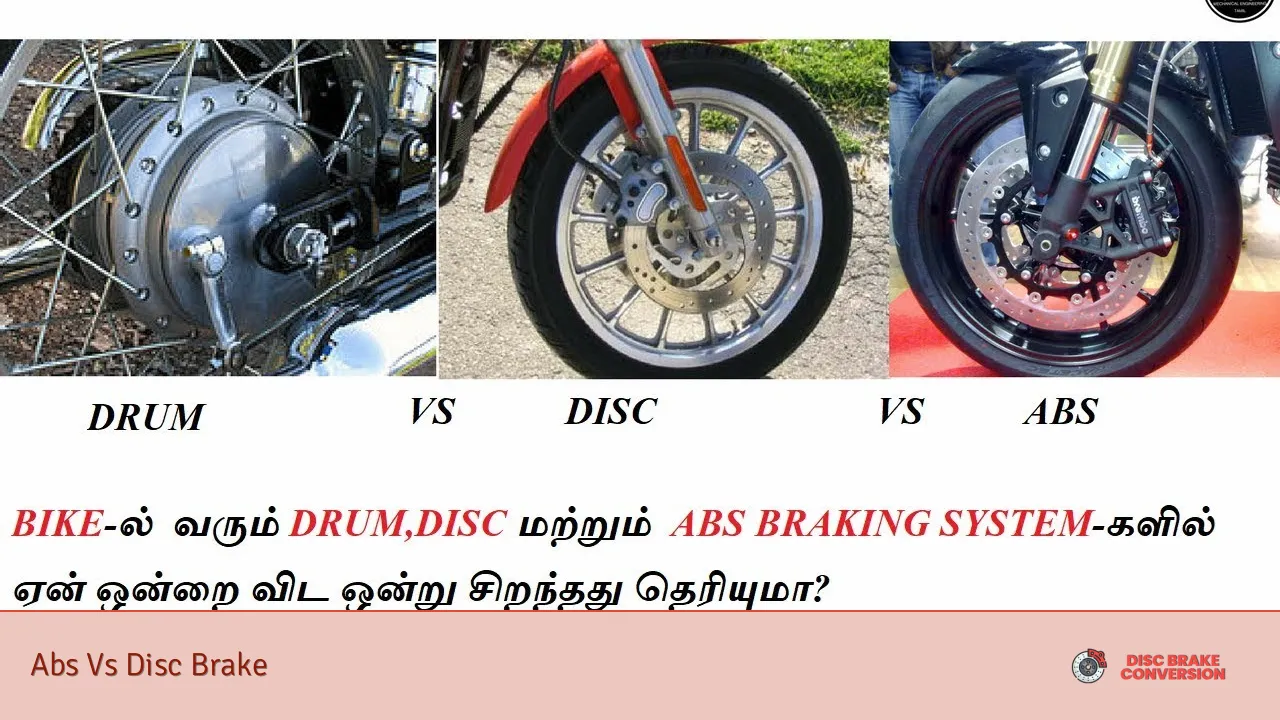Hey, fellow drivers! Are you ready to dive into the world of brakes? Today, we’re going to unravel the mystery behind two popular contenders in the braking arena: ABS and disc brakes. Buckle up, because we’re about to explore the key details that make these brakes tick!
Let’s start with ABS, which stands for Anti-lock Braking System. Imagine this scenario: you’re driving on a rainy day, and suddenly, you need to slam on the brakes. ABS comes to your rescue by preventing the wheels from locking up, allowing you to maintain control and steer away from potential trouble. It’s like having a superhero sidekick for your brakes, ensuring you stay safe even in challenging road conditions.


On the other hand, disc brakes are the unsung heroes of stopping power. Picture a spinning disc attached to your wheels. When you hit the brakes, a pair of brake pads squeeze onto the disc, generating friction that slows down your vehicle. It’s an efficient and reliable system, providing strong stopping power and dissipating heat effectively. Disc brakes are like the dependable friends who always have your back when it comes to bringing your ride to a halt.
But how do these two brake systems compare? Well, while ABS prevents wheel lock-up, disc brakes excel at delivering consistent and responsive stopping power. Think of ABS as the strategist, ensuring control, while disc brakes are the workhorses, providing the muscle needed to stop your vehicle quickly and reliably.
In terms of maintenance, both ABS and disc brakes require regular check-ups and occasional repairs. However, disc brakes are generally easier to inspect and replace, making them more cost-effective in the long run.
So, there you have it, folks! The battle of brakes has revealed some fascinating insights. ABS and disc brakes each bring unique strengths to the table. Whether you prioritize control or stopping power, understanding these systems will empower you to make informed choices when it comes to your vehicle’s safety.
Remember, the choice between ABS and disc brakes ultimately depends on your personal preferences and driving needs. Stay vigilant, maintain your brakes, and enjoy the peace of mind that comes with knowing you have reliable stopping power on your side. Drive safely out there!
Breaking the Mold: The Battle Between Abs and Disc Brakes in Modern Automotive Technology
When it comes to modern automotive technology, one of the ongoing battles revolves around the choice between ABS (Anti-lock Braking System) and disc brakes. These two braking systems have their strengths and weaknesses, and understanding their differences is crucial for both car enthusiasts and everyday drivers.
Let’s start with ABS brakes. Imagine you’re driving on a wet road, and suddenly a pedestrian steps into your path. Panicked, you slam your foot on the brake pedal. With traditional brakes, the wheels would lock up, causing your car to skid uncontrollably. However, this is where ABS brakes shine. They prevent wheel lock-up by rapidly pulsating the brakes, allowing you to maintain steering control and significantly reducing the stopping distance. ABS brakes are like an experienced tightrope walker: they keep your vehicle balanced and stable even in the most challenging situations.
On the other hand, disc brakes have made significant advancements in recent years, positioning themselves as a worthy competitor to ABS brakes. Disc brakes work by using calipers to squeeze brake pads against a rotor, which slows down and eventually stops the wheel from spinning. This design offers consistent and reliable stopping power, making it ideal for high-performance vehicles. Disc brakes are akin to a superhero’s grip, providing quick and precise stopping abilities that car enthusiasts adore.
So, how do we determine which braking system is superior? It ultimately boils down to personal preference and driving needs. If you often encounter slippery conditions or drive in areas with frequent rain or snow, ABS brakes can give you the added confidence and safety you need. On the other hand, if you appreciate responsive braking performance and enjoy spirited driving, disc brakes might be your go-to choice.
The battle between ABS and disc brakes continues to shape the landscape of modern automotive technology. Each comes with unique features and benefits, catering to different driving scenarios and preferences. Whether you prioritize stability in adverse conditions or crave the exhilaration of quick stops, breaking the mold and choosing the right braking system for your vehicle will ensure a safer and more enjoyable driving experience.
The Great Debate: Which Reigns Supreme – ABS or Disc Brakes?
Picture this: You’re cruising down the road on a beautiful summer day, wind in your hair, and a smile on your face. Suddenly, you encounter a hazard and need to hit the brakes. In that split second, you rely on your vehicle’s braking system to bring you to a safe stop. But which braking technology is truly supreme? Enter the great debate between ABS (Anti-lock Braking System) and disc brakes.
Let’s start with ABS – a revolutionary safety feature that has become increasingly common in modern vehicles. ABS prevents the wheels from locking up during hard braking, allowing the driver to maintain control of the vehicle. By rapidly modulating brake pressure, ABS ensures that the wheels continue to rotate, thereby maximizing traction and reducing the risk of skidding. It’s like having a superhero sidekick for your brakes, fighting against the forces of loss of control.
On the other hand, we have disc brakes, a tried-and-true technology that has been around for decades. Disc brakes work by applying friction to a rotating disc, which is connected to the wheel. This friction slows down the rotation of the wheel and brings the vehicle to a stop. Think of it as a powerful clamp gripping onto a spinning wheel, gradually bringing it to a halt. Disc brakes offer consistent performance, excellent heat dissipation, and are generally easier to maintain compared to their drum brake counterparts.
So, which one is superior? Well, it depends on various factors. ABS shines in emergency situations, where maintaining control is crucial. It prevents wheel lock-up and allows the driver to steer around obstacles, potentially avoiding a collision altogether. On the flip side, disc brakes excel in providing reliable stopping power under normal driving conditions. They offer better modulation, meaning the driver can apply varying amounts of braking force smoothly and predictably.
Revolutionizing Braking Systems: Exploring the Advantages of ABS and Disc Brakes
When it comes to ensuring safety on the roads, braking systems play a crucial role. Over the years, advancements in automotive technology have led to the development of more efficient braking systems. Two such innovations that have revolutionized the way vehicles stop are Anti-lock Braking Systems (ABS) and disc brakes. In this article, we will delve into the advantages these braking systems offer, providing you with insights into their remarkable features.
Let’s start by exploring ABS, which is designed to prevent wheels from locking up during braking, thereby allowing the driver to maintain control over the vehicle. One of the primary advantages of ABS is its ability to significantly reduce braking distance. By automatically modulating the brake pressure on each wheel, ABS ensures maximum grip between the tires and the road. This feature proves invaluable in emergency situations, where every inch matters.
In addition to enhanced control, ABS also improves steering response. When sudden braking occurs, traditional braking systems can cause the wheels to lock up, leading to skidding and loss of steering control. With ABS, however, the system constantly monitors wheel speed and adjusts the braking force accordingly, preventing wheel lock-up and enabling the driver to steer around obstacles smoothly. This not only enhances safety but also provides a sense of confidence behind the wheel.
Now, let’s shift our focus to disc brakes, which have become increasingly popular in modern vehicles. Disc brakes use a flat, circular metal rotor that rotates with the wheel. When the brakes are applied, hydraulic calipers squeeze brake pads against the rotor, creating friction that slows down the vehicle. One of the key advantages of disc brakes is their superior heat dissipation capability. The rotor’s exposed design allows heat to dissipate quickly, preventing brake fade and maintaining consistent braking performance even under demanding conditions.
Furthermore, disc brakes provide excellent stopping power. Their larger surface area and more efficient design allow for greater contact between the brake pads and the rotor, resulting in shorter stopping distances. This advantage is particularly evident during high-speed braking maneuvers or when carrying heavy loads.
The advancements in braking systems have transformed the way vehicles come to a stop, ensuring both safety and control. ABS prevents wheel lock-up and improves steering response, offering drivers enhanced control in emergency situations. Disc brakes excel in heat dissipation and provide superior stopping power, making them an ideal choice for modern vehicles. With these remarkable features, ABS and disc brakes continue to revolutionize the automotive industry, setting new standards for braking performance and safety.
Unveiling the Future of Braking: How ABS and Disc Brakes are Changing the Driving Experience

Introduction:
Brace yourself for a thrilling ride as we delve into the future of braking technology. In this article, we’ll explore the incredible advancements in Anti-lock Braking System (ABS) and Disc Brakes that are revolutionizing the driving experience. Get ready to witness how these cutting-edge innovations enhance safety, control, and overall vehicle performance.
Unleashing Control with ABS:
Imagine cruising down the road, approaching an unexpected obstacle. With traditional brakes, panic would set in as your wheels lock up, causing your vehicle to lose traction and skid uncontrollably. Enter ABS, a game-changer that empowers drivers to maintain steering control during hard braking.
ABS works its magic by rapidly modulating brake pressure on each wheel. By preventing wheel lock-up and ensuring continuous tire rotation, ABS maximizes grip and stability. Gone are the days of heart-stopping moments; ABS enables you to steer away from danger while maintaining optimal braking effectiveness.
The Powerhouse of Precision: Disc Brakes:
While drum brakes were once the go-to choice, disc brakes have emerged as the epitome of precision and stopping power. Think of them as the superheroes of braking systems – swift, efficient, and highly reliable.
Unlike their drum counterparts, disc brakes employ a pair of calipers that squeeze onto a spinning disc (or rotor) attached to the wheel. This design offers several advantages. Firstly, it dissipates heat more effectively, reducing the risk of brake fade during intense use. Secondly, disc brakes provide consistent and responsive braking performance, even under extreme conditions.
The Perfect Symbiosis:
When ABS and disc brakes combine forces, the result is a driving experience that’s nothing short of awe-inspiring. ABS complements the inherent capabilities of disc brakes, taking their performance to new heights.
By preventing wheel lock-up, ABS enables disc brakes to operate at their maximum potential. The synergy between these technologies ensures superior control and responsiveness, minimizing the risk of accidents and promoting safer driving on diverse road conditions.
Conclusion:
In the ever-evolving realm of automotive technology, ABS and disc brakes stand as the beacons of progress. Their marriage of safety, control, and performance is shaping the future of braking systems. Get ready to embrace a driving experience where panic is replaced by confidence, and where the thrill of the journey meets the assurance of safety. Let’s celebrate the remarkable achievements of ABS and disc brakes as we embark on this exciting era in automotive history.

